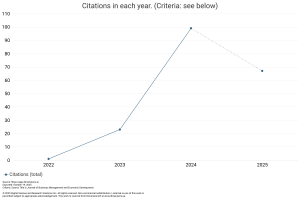Key Factors for University Business Incubator Implementation (UBI): Literature Review
DOI:
https://doi.org/10.59653/jbmed.v2i01.335Keywords:
Key Success Factors (KPIs), University Business Incubator (UBI), UBI organizational aspects, UBI service aspects, UBI success measurement aspectsAbstract
Business and entrepreneurship are risky activities, especially for new business people. One of the ideal business incubators is the one created by the campus, which is referred to as the University Business Incubator (UBI). However, it is not easy to ensure that UBI successfully carries out its vision and mission, for that it is necessary to study the Key Success Factors (KPIs) of UBI's success. From the criteria set, 15 articles become the unit of analysis of this literature review research. The results of the review found 7 conclusions. First, there are 3 aspects in making UBI, namely organization, service, and measuring the success of UBI and tenants. Second, important organizational aspects are UBI management, capital support, technology, facilities, ideas, networks, strategies, as well as communication or promotion. Third, the aspect of services to be provided depends on the location of the country and the business character of the tenant. Fourth, the recommended physical services are office space and production space. Non-physical services recommended are training/ consulting/ assistance, capital support, technology, facilities and ideas, networks, strategies, and communication or promotion of tenant products. Fifth, the recommended training areas are business technical, marketing, finance and banking, export-import, law, human resources and product development. Sixth, the role of the academic community can be as experts, sources of business networks, and other support personnel. Seventh, UBI success measurement can be done using financial performance and can be combined with operational performance.
Downloads
References
Adhana, D. (2020). Start-Up Ecosystem in India: A Study With Focus on Entrepreneurship and University Business Incubators. SSRN Electronic Journal, 8(9), 754–772. https://doi.org/10.2139/ssrn.3702510
Ahmed, N., Li, C., Qalati, S. A., Rehman, H. U., Khan, A., & Rana, F. (2022). Impact of Business Incubators on Sustainable Entrepreneurship Growth with Mediation Effect. Entrepreneurship Research Journal, 12(2), 137–160. https://doi.org/10.1515/erj-2019-0116
Albort-Morant, G., & Ribeiro-Soriano, D. (2016). A bibliometric analysis of international impact of business incubators. Journal of Business Research, 69(5), 1775–1779. https://doi.org/10.1016/j.jbusres.2015.10.054
Alpenidze, O., Pauceanu, A. M., & Sanyal, S. (2019). Key success factors for business incubators in Europe: An empirical study. Academy of Entrepreneurship Journal, 25(1).
Aramesh, H., & Dehghani, M. (2019). Key factors of the success of knowledge-based companies relied on academic incubator centers. 4(2), 101–110. https://doi.org/10.22034/IJHCUM.2019.02.03
Ayatse, F. A., Kwahar, N., & Iyortsuun, A. S. (2017). Business incubation process and firm performance: an empirical review. Journal of Global Entrepreneurship Research, 7(1). https://doi.org/10.1186/s40497-016-0059-6
Bose, S. C., Kiran, R., & Goyal, D. (2019). Critical success factors of agri-business incubators and their impact on business. Custos e Agronegocio, 15(1), 352–378.
Carletto, C., Corral, P., & Guelfi, A. (2017). Agricultural commercialization and nutrition revisited: Empirical evidence from three African countries. Food Policy, 67, 106–118. https://doi.org/10.1016/j.foodpol.2016.09.020
Dahms, S., & Kingkaew, S. (2016). University business incubators: An institutional demand side perspective on value adding features. Entrepreneurial Business and Economics Review, 4(3), 41–56. https://doi.org/10.15678/EBER.2016.040304
Dhochak, M., Acharya, S. R., & Sareen, S. B. (2019). Assessing the effectiveness of business incubators. International Journal of Innovation and Learning, 26(2), 177–194. https://doi.org/10.1504/IJIL.2019.101277
Dutt, N., Hawn, O., Vidal, E., Chatterji, A., McGahan, A., & Mitchell, W. (2016). How Open System Intermediaries Address Institutional Failures: The Case of Business Incubators in Emerging-Market Countries. Academy of Management Journal, 59(3), 818–840.
Elena, R. (2014). The effectiveness of business incubators as the element of the universities’ spin-off strategy in Russia. International Journal of Technology Management and Sustainable Development, 13(3), 265–281. https://doi.org/10.1386/tmsd.13.3.265_1
Hassan, N. A. (2020). University business incubators as a tool for accelerating entrepreneurship: theoretical perspective. Review of Economics and Political Science. https://doi.org/10.1108/reps-10-2019-0142
Hou, B., Hong, J., & Yang, Y. (2022). Geographical aggregation and incubator graduation performance: the role of incubator assistance. European Journal of Innovation Management, 25(1), 150–172. https://doi.org/10.1108/EJIM-07-2020-0280
Kiani Mavi, R., Gheibdoust, H., Khanfar, A. A., & Kiani Mavi, N. (2019). Ranking factors influencing strategic management of university business incubators with ANP. Management Decision, 57(12), 3492–3510. https://doi.org/10.1108/MD-06-2018-0688
Klonaridis, R. (2020). Comparison Between South African Service Industry Sectors’ Requirements From University Business Incubators. International Journal of Business And Management Studies, 12(1), 225–240.
Li, C., Ahmed, N., Qalati, S. A., Khan, A., & Naz, S. (2020). Role of business incubators as a tool for entrepreneurship development: The mediating and moderating role of business start-up and government regulations. Sustainability (Switzerland), 12(5), 1–23. https://doi.org/10.3390/su12051822
Marlow, S., & McAdam, M. (2015). Incubation or induction? Gendered identity work in the context of technology business incubation. Entrepreneurship Theory and Practice, 39(4), 791–816. https://doi.org/10.1177/104225879101500307
Muslim Saraireh, S. A. (2021). The role of business incubators in the economic development and creativity in jordanian universities: Evidence from mutah university. Academic Journal of Interdisciplinary Studies, 10(1), 266–282. https://doi.org/10.36941/ajis-2021-0023
Redondo, M., & Camarero, C. (2019). Social Capital in University Business Incubators: dimensions, antecedents and outcomes. International Entrepreneurship and Management Journal, 15(2), 599–624. https://doi.org/10.1007/s11365-018-0494-7
Siddiqui, K. A., Al-Shaikh, M. E., Bajwa, I. A., & Al-Subaie, A. (2021). Identifying critical success factors for university business incubators in Saudi Arabia. Entrepreneurship and Sustainability Issues, 8(3), 267–279. https://doi.org/10.9770/jesi.2021.8.3(15)
Snyder, H. (2019). Literature review as a research methodology: An overview and guidelines. Journal of Business Research, 104(August), 333–339. https://doi.org/10.1016/j.jbusres.2019.07.039
Solihin, I., Nugraha, D. N. S., Marinda, V. S., & Augustrianto, A. (2020). The Analysis of the Relationship between Undergraduate and Diploma Unemployment Level with the Number of Business Incubators of Universities in Indonesia. International Journal of Psychosocial Rehabilitation, 24(02), 3413–3417. https://doi.org/10.37200/ijpr/v24i2/pr200657
Soltanifar, E., Keramati, A., & Moshki, R. (2012). An innovative model of business management in knowledge-based organisations: The case of the business incubators. International Journal of Business Innovation and Research, 6(5), 573–596. https://doi.org/10.1504/IJBIR.2012.048787
U. Osiobe, E., & Winingham, K. (2020). Why Universities Create and Foster Business Incubators? Journal of Small Business and Entrepreneurship Development, 8(1), 1–12. https://doi.org/10.15640/jsbed.v8n1a1
Wang, Z., He, Q., Xia, S., Sarpong, D., Xiong, A., & Maas, G. (2020). Capacities of business incubator and regional innovation performance. Technological Forecasting and Social Change, 158(May), 120125. https://doi.org/10.1016/j.techfore.2020.120125
Wolniak, R., Grebski, M. E., & Skotnicka-Zasadzień, B. (2019). Comparative analysis of the level of satisfaction with the services received at the business incubators (Hazleton, PA, USA and Gliwice, Poland). Sustainability (Switzerland), 11(10). https://doi.org/10.3390/su11102889
Wu, W., Wang, H., & Wu, Y. J. (2021). Internal and external networks, and incubatees’ performance in dynamic environments: entrepreneurial learning’s mediating effect. Journal of Technology Transfer, 46(6), 1707–1733. https://doi.org/10.1007/s10961-020-09790-w
Zhang, L., Gao, P., Zhou, Y., Zhang, Y., & Wang, J. (2019). Surviving through incubation based on entrepreneurship-specific human capital development: The moderating role of tenants’ network involvement. Sustainability (Switzerland), 11(10). https://doi.org/10.3390/su11102866
Downloads
Published
How to Cite
Issue
Section
License
Copyright (c) 2023 Ahmad Adriansyah, Santi Rimadias

This work is licensed under a Creative Commons Attribution-ShareAlike 4.0 International License.
Authors who publish with this journal agree to the following terms:
- Authors retain copyright and grant the journal right of first publication with the work simultaneously licensed under a Creative Commons Attribution-ShareAlike that allows others to share the work with an acknowledgement of the work's authorship and initial publication in this journal.
- Authors are able to enter into separate, additional contractual arrangements for the non-exclusive distribution of the journal's published version of the work (e.g., post it to an institutional repository or publish it in a book), with an acknowledgement of its initial publication in this journal.
- Authors are permitted and encouraged to post their work online (e.g., in institutional repositories or on their website) prior to and during the submission process, as it can lead to productive exchanges, as well as earlier and greater citation of published work (See The Effect of Open Access).





























